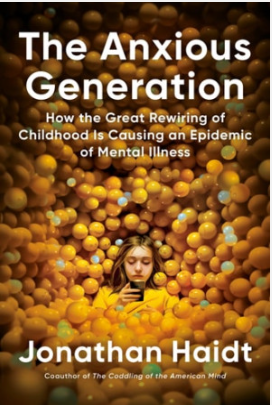Jonathan Haidt’s The Anxious Generation is a timely and thought-provoking exploration of the unprecedented mental health crisis affecting today’s youth. With his signature blend of rigorous research and accessible prose, Haidt argues that the fundamental nature of childhood has been radically altered—and not for the better. At the heart of his thesis is the claim that the shift from a play-based childhood to a phone-based existence has rewired development, leaving young people more anxious, depressed, and fragile than ever before.
Haidt identifies four key transformations that have reshaped childhood over the past few decades:
- The Decline of Free Play – Unstructured, unsupervised play has been replaced by adult-supervised activities and screen time, depriving children of opportunities to develop resilience, problem-solving skills, and emotional regulation.
- The Rise of Smartphones and Social Media – The advent of smartphones (particularly post-2010) has fundamentally altered social interaction, exposing young people—especially girls—to relentless social comparison, cyberbullying, and dopamine-driven feedback loops.
- Overprotective Parenting – “Safetyism” and helicopter parenting have reduced children’s autonomy, preventing them from learning how to navigate risk, failure, and independence.
- The Schoolification of Childhood – Academic pressures and the decline of recess and unstructured time have turned childhood into a high-stakes performance rather than a period of exploration.
